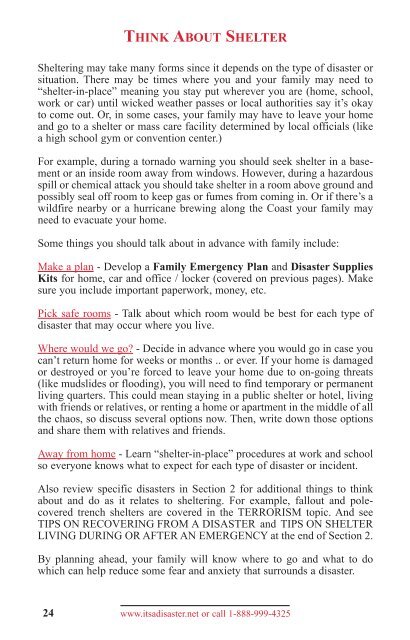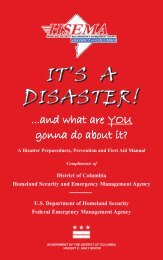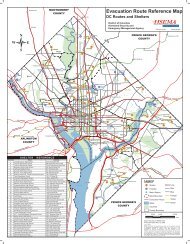disaster 5th 1108_5th ed 2011 - Homeland Security and Emergency ...
disaster 5th 1108_5th ed 2011 - Homeland Security and Emergency ...
disaster 5th 1108_5th ed 2011 - Homeland Security and Emergency ...
Create successful ePaper yourself
Turn your PDF publications into a flip-book with our unique Google optimized e-Paper software.
THINK ABOUT SHELTER<br />
Sheltering may take many forms since it depends on the type of <strong>disaster</strong> or<br />
situation. There may be times where you <strong>and</strong> your family may ne<strong>ed</strong> to<br />
“shelter-in-place” meaning you stay put wherever you are (home, school,<br />
work or car) until wick<strong>ed</strong> weather passes or local authorities say it’s okay<br />
to come out. Or, in some cases, your family may have to leave your home<br />
<strong>and</strong> go to a shelter or mass care facility determin<strong>ed</strong> by local officials (like<br />
a high school gym or convention center.)<br />
For example, during a tornado warning you should seek shelter in a basement<br />
or an inside room away from windows. However, during a hazardous<br />
spill or chemical attack you should take shelter in a room above ground <strong>and</strong><br />
possibly seal off room to keep gas or fumes from coming in. Or if there’s a<br />
wildfire nearby or a hurricane brewing along the Coast your family may<br />
ne<strong>ed</strong> to evacuate your home.<br />
Some things you should talk about in advance with family include:<br />
Make a plan - Develop a Family <strong>Emergency</strong> Plan <strong>and</strong> Disaster Supplies<br />
Kits for home, car <strong>and</strong> office / locker (cover<strong>ed</strong> on previous pages). Make<br />
sure you include important paperwork, money, etc.<br />
Pick safe rooms - Talk about which room would be best for each type of<br />
<strong>disaster</strong> that may occur where you live.<br />
Where would we go - Decide in advance where you would go in case you<br />
can’t return home for weeks or months .. or ever. If your home is damag<strong>ed</strong><br />
or destroy<strong>ed</strong> or you’re forc<strong>ed</strong> to leave your home due to on-going threats<br />
(like mudslides or flooding), you will ne<strong>ed</strong> to find temporary or permanent<br />
living quarters. This could mean staying in a public shelter or hotel, living<br />
with friends or relatives, or renting a home or apartment in the middle of all<br />
the chaos, so discuss several options now. Then, write down those options<br />
<strong>and</strong> share them with relatives <strong>and</strong> friends.<br />
Away from home - Learn “shelter-in-place” proc<strong>ed</strong>ures at work <strong>and</strong> school<br />
so everyone knows what to expect for each type of <strong>disaster</strong> or incident.<br />
Also review specific <strong>disaster</strong>s in Section 2 for additional things to think<br />
about <strong>and</strong> do as it relates to sheltering. For example, fallout <strong>and</strong> polecover<strong>ed</strong><br />
trench shelters are cover<strong>ed</strong> in the TERRORISM topic. And see<br />
TIPS ON RECOVERING FROM A DISASTER <strong>and</strong> TIPS ON SHELTER<br />
LIVING DURING OR AFTER AN EMERGENCY at the end of Section 2.<br />
By planning ahead, your family will know where to go <strong>and</strong> what to do<br />
which can help r<strong>ed</strong>uce some fear <strong>and</strong> anxiety that surrounds a <strong>disaster</strong>.<br />
24 www.itsa<strong>disaster</strong>.net or call 1-888-999-4325





